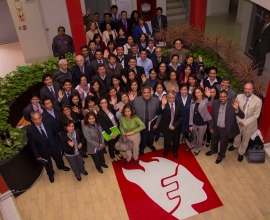Defining levels of government for implementation of the results-oriented budget in Peru
A discussion workshop was held in Lima to put the finishing touches on a management model to enable budget programmes in Peru to be structured on a territorial basis
Since its beginnings, the European Union's EUROsociAL programme—specifically its Public Finance area—has been supporting the type of budget reform in which the Ministry of Economy and Finance of Peru is currently immersed. It consists of implementation of the Results-Oriented Budget (ROB).
From the Decentralisation area, support is also being provided for territorial organisation of budgetary programmes within the framework of an as-yet unfinished decentralisation process. The progress made notwithstanding, a diagnosis is being conducted that will provide additional information for putting the finishing touches on a management model for the implementation of budgetary programmes.
This diagnosis is being carried out using the peer review methodology. This methodology consists of an assessment or evaluation of a policy or policy instrument of one country (the examined country) by other countries (normally policymakers or public servants working in counterpart institutions) in order to improve the design and/or effectiveness of the policy or instrument, adopt best practices or even to adapt it to international standards and principles. This review enables a process of experience exchange and comparative evaluation of practices, challenges and solutions between countries.
This workshop, in which the preliminary draft of the diagnosis was discussed, served to facilitate dialogue and mutual learning with the ‘reviewers’: Fernando Rojas, a consultant from the World Bank who has been advising governments in different countries in the region and has led various projects involving reform of the state; Salvador Maluquer i Amorós, former Director-General of Budgets of the Government of Catalonia (2004-2012), who has faced implementation of a similar reform involving budgetary modernisation; and Cilair Rodrigues, Deputy Secretary of the Federal Budget of Brazil, one of the countries in Latin America that has advanced the most in budgetary programmes in a federal context.
It should be noted that Peru sent a local team from the Ministry of Economy and Finance and the CEPLAN for this analysis which is actively participating to ensure a greater degree of precision and reliability. In addition, multiple stakeholders, representatives of sectoral ministries and sub-national governments are participating in this process. As Rodolfo Acuña, Director-General of Budget, stated in reference to the workshop, “this is the beginning of the discussion. It doesn't end here. We're just getting started. We have to make a difference for the next administration, so that what we're doing serves some purpose and can be used to improve the country”.
FIIAPP

